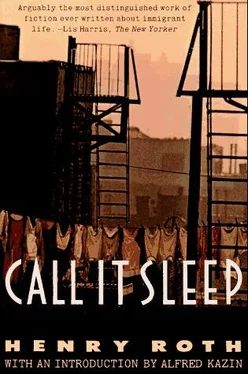In the frontroom, the sound of a window opening, shutting again. His mother came in, bearing a grey covered pot between her hands. Rain drops on its sides, water in the hollow of the lid.
“A fearful night.” She emptied the overflowing lid into the sink. “The fish is frozen.”
Too late now.
He must stay here now, till the end, till Luter had come and gone. But perhaps his mother was wrong and perhaps Luter wouldn’t come, if only he never came again. Why should he come here again? He was here yesterday and there was nobody home. Don’t come here, his mind whispered to itself again and again. Please, Mr. Luter, don’t come here! Don’t come here any more.
The minutes passed, and just at that moment when it seemed to David that he had forgotten about Luter, the familiar tread of feet scraped through the hallway below. Voices on the stair! Luter had come. With one look at his mother’s pursed, attentive face, he sidled toward the frontroom, sneaked up the stairs and into the dark. He stood at the window, listening to the sounds behind him. The door was opened. He heard their greetings, Luter’s voice and slow speech. They must be taking their coats off now. If only they would forget about him. If only it were possible. But—
“Where’s the prayer?” he heard his father ask.
A pause and his mother’s voice. “He’s in the frontroom I think. David!”
“Yes, mama.” A wave of anger and frustration shook him.
“He’s there.”
Satisfied that he was there, they seemed to forget him for a little while, but again his father and this time with the dangerous accent of annoyance.
“Well, why doesn’t he come in? David!”
There could be no more delay. He must go in. Eyes fixed before his feet, he came out of the frontroom, shuffled to his seat and sat down, conscious all the time that the others were gazing at him curiously.
“What’s the matter with him?” asked his father sharply.
“I don’t quite know. Perhaps his stomach. He has eaten very little today.”
“Well, he’ll eat now,” said his father warningly. “You feed him too many trifles.”
“A doubtful stomach is a sad thing,” said Luter condoningly, and David hated him for his sympathy.
“Ach,” exclaimed his father, “it isn’t his stomach, Joe, it’s his palate — jaded with delicacies.”
His mother set the soup before him. “This will taste good,” she coaxed.
He dared not refuse, though the very thought of eating sickened him. Steeling himself against the first mouthful, he dipped the spoon into the shimmering red liquid, lifted it to his lips. Instead of reaching his mouth, the spoon reached only his chin, struck against the hollow under his lower lip, scalded it, fell from his nerveless fingers into the plate. A red fountain splashed out in all directions, staining his blouse, staining the white table cloth. With a feeling of terror David watched the crimson splotches on the cloth widen till they met each other.
His father lowered his spoon angrily into his plate. “Lame as a Turk!” he snapped, rapping the table with his knuckles. “Will you lift your head, or do you want that in the plate too?”
He raised frightened eyes. Luter glanced at him sidewise, sucking his teeth in wary disapproval.
“It’s nothing!” exclaimed his mother comfortingly. “That’s what table cloths were made for.”
“To splash soup on, eh?” retorted her husband sarcastically. “And that’s what shirts were made for too! Very fine. Why not the whole plate while he’s at it.”
Luter chuckled.
Without answering, his mother reached over and stroked his brow with her palm. “Go on and eat, child.”
“What are you doing now,” demanded his father, “sounding his brow for fever? Child! There’s absolutely nothing wrong with the brat, except your pampering him!” He shook his finger at David ominously. “Now you swill your soup like a man, or I’ll ladle you out something else instead.”
David whimpered, eyed his plate in cowed rebellion.
“Take heed!”
“Perhaps he had better not eat,” interposed his mother.
“Don’t interfere.” And to David, “Are you going to eat?”
Trembling, and almost on the verge of nausea, David picked up the spoon and forcing himself, ate. The sickening spasm passed.
Impatiently, his father turned to Luter. “What were you saying, Joe?”
“I was saying,” said Luter in his slow voice, “that you would have to lock up the place after you left — only one door, you see. The rest I will close before I go.” He reached into his coat pocket and drawing out a ring of keys, detached one. “This one closes it. And I’ll tell you,” he handed the key to David’s father. “I’m putting it down as four hours. The whole job won’t take you more than two — three at most.”
“I see.”
“You won’t get the extra this week though. The bookkeeper—”
“Next week then.”
Luter cleared his throat. “You’re having one diner less tomorrow evening,” he said to David’s mother.
“Yes?” she asked in constrained surprise, and turning to David’s father, “Will you be so late, Albert?”
“Not I.”
“No, not Albert,” chuckled Luter, “I.”
David’s heart leaped in secret joy.
“Then I shan’t prepare dinner for you tomorrow night?”
“No, I have something to do tomorrow night,” he said vaguely. “Sunday perhaps. No, I’ll tell you. If I’m not here by seven o’clock Sunday, don’t keep the dinner waiting for me.”
“Very well.”
“I’ll pay for the week in full anyhow.”
“If you’re not coming—” she objected.
“Oh, that doesn’t matter,” said Luter, “that’s settled.” He nodded and picked up his spoon.
During the rest of the meal, David ate cautiously peering up furtively from time to time to see whether anything he did was displeasing his father. At Luter, he never ventured a glance for fear the very sight of the man would confuse him into further blunders. By the time his mother set the dessert before him, he was already casting about for some way to retreat, some place where he could hide and yet be thought present, or at least, be accounted for. He might feign drowsiness and his mother would put him to bed, but he could not do that now. It was too early. What would he do till then? Where could he escape for a little while? The rooms of the house passed before his mind. The frontroom? His father would say, “What is he doing in there in the dark?” The bedroom? No. His father would say the same thing. Where? The bathroom. Yes! He would sit on the toilet seat. Stay there till he heard some one call, then come out.
He had eaten the last prune, and was just about to slip from his chair when out of the corner of his eye, he saw Luter’s hand move toward his vest-pocket and draw out his watch.
“I must go!” He smacked his lips.
He was going! David could have danced for joy. It was too good to be true!
“So soon?” asked his mother.
To David’s surprise, his father laughed, and a moment later Luter joined him as if they shared some secret joke.
“I’m somewhat late as it is.” Luter pushed his chair back and rose. “But first I must pay you.”
David stared at his plate, listening. He could think of only one thing — Luter was going, would be gone in another minute. He glanced up. His father had just gone into the bedroom and in the moment of his absence Luter darted quick eyes at his mother. David shivered with revulsion and hastily looked down. Taking the coat which David’s father had just brought out, Luter got into it, and David with all the forces of his mind, tried to hasten the feet that were moving toward the door.
“Well,” Luter finally said, “a good week to you all. May the prayer,” his hat pointed at David, “recover soon.”
Читать дальше












